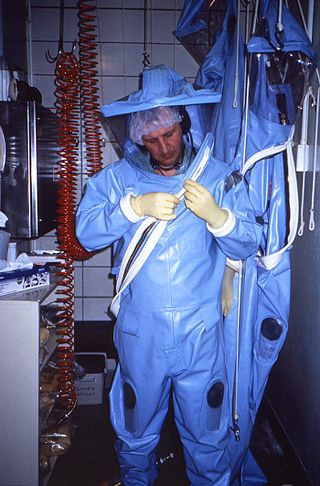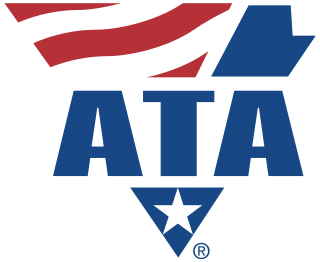
Biosafety is the prevention of large-scale loss of biological integrity, focusing both on ecology and human health. These prevention mechanisms include the conduction of regular reviews of biosafety in laboratory settings, as well as strict guidelines to follow. Biosafety is used to protect from harmful incidents. Many laboratories handling biohazards employ an ongoing risk management assessment and enforcement process for biosafety. Failures to follow such protocols can lead to increased risk of exposure to biohazards or pathogens. Human error and poor technique contribute to unnecessary exposure and compromise the best safeguards set into place for protection.

The United States Department of Transportation is one of the executive departments of the U.S. federal government. It is headed by the secretary of transportation, who reports directly to the president of the United States and is a member of the president's Cabinet.
In the United States government, independent agencies are agencies that exist outside the federal executive departments and the Executive Office of the President. In a narrower sense, the term refers only to those independent agencies that, while considered part of the executive branch, have regulatory or rulemaking authority and are insulated from presidential control, usually because the president's power to dismiss the agency head or a member is limited.

The International Trade Administration (ITA) is an agency in the United States Department of Commerce that promotes United States exports of nonagricultural U.S. services and goods.
The Texas A&M Transportation Institute (TTI) in Bryan/College Station, Texas is a transportation research agency in the United States. The institute was created in 1950, primarily in response to the needs of the Texas Highway Department. TTI is a state agency and a member of the Texas A&M University System.

The American Public Transportation Association (APTA) is a nonprofit group of approximately 1,500 public and private sector member organizations that promotes and advocates for the interests of the public transportation industry in the United States.
The National Highway Traffic Safety Administration is an agency of the U.S. federal government, part of the Department of Transportation, focused on transportation safety in the United States.

The Renewable Fuels Association (RFA) represents the ethanol industry promoting policies, regulations, and research and development initiatives that will lead to the increased production and use of ethanol fuel. First organized in 1981, RFA serves as a voice of advocacy for the ethanol industry, providing research data and industry analysis to its members, to the public via the media, to the United States Congress, as well as to related federal and state agencies.
A Patient Safety Organization (PSO) is a group, institution, or association that improves medical care by reducing medical errors. Common functions of patient safety organizations are data collection, analysis, reporting, education, funding, and advocacy. A PSO differs from a Federally designed Patient Safety Organization (PSO), which provides health care providers in the U.S. privilege and confidentiality protections for efforts to improve patient safety and the quality of patient care delivery
The American Highway Users Alliance, is a non-profit advocacy group representing many businesses in the automotive and road construction sector. The organization, which was founded by General Motors and others in 1932, merged with the Automotive Safety Foundation and Auto Industries Highway Safety Committee in 1970.
Executive Schedule is the system of salaries given to the highest-ranked appointed officials in the executive branch of the U.S. government. The president of the United States appoints individuals to these positions, most with the advice and consent of the United States Senate. They include members of the president's Cabinet, several top-ranking officials of each executive department, the directors of some of the more prominent departmental and independent agencies, and several members of the Executive Office of the President.

The American Trucking Associations (ATA), founded in 1933, is the largest national trade association for the trucking industry. ATA represents more than 37,000 members covering every type of motor carrier in the United States through a federation of other trucking groups, industry-related conferences, and its 50 affiliated state trucking associations. Former Governor of Kansas Bill Graves was replaced by Chris Spear as the ATA's president and CEO in July 2016.
The National Propane Gas Association (NPGA) is an American trade association representing and advocating on behalf of the U.S. propane and renewable propane industries. Propane has a low-carbon content, has no methane emissions, is nontoxic, and is designated an approved clean, alternative fuel under the Clean Air Act Amendments.

The Sulphur Institute, or TSI, is an international non-profit organization which acts as a global advocate for sulfur and sulfur producers.

The Commercial Spaceflight Federation is a private spaceflight industry group, incorporated as an industry association for the purposes of establishing ever higher levels of safety for the commercial human spaceflight industry, sharing best practices and expertise, and promoting the growth of the industry worldwide. Issues that the Commercial Spaceflight Federation work on include, but are not limited to, airspace issues, FAA regulations and permits, industry safety standards, public outreach, and public advocacy for the commercial space sector.
The National Railroad Construction and Maintenance Association, Inc. (NRC) is a trade association in the railroad and rail transit construction industry. The NRC is a non-profit trade association, governed by a board of directors and administered by the Washington, D.C., government relations firm, TGA AMS. NRC members include rail construction and maintenance contractors such as Balfour Beatty Rail, Inc.,Colo Railroad Builders, Delta Railroad Construction, Inc., Herzog Contracting Corp., Kiewit Western Co., Loram Maintenance of Way, Inc., RailWorks Corporation, and Stacy and Witbeck, Inc.; in addition to supplier companies such as A&K Railroad Materials, Inc., Harsco Rail, L. B. Foster Company, Progress Rail Services, Inc., and Western-Cullen-Hayes, Inc.

People who are driving as part of their work duties are an important road user category. First, workers themselves are at risk of road traffic injury. Contributing factors include fatigue and long work hours, delivery pressures, distractions from mobile phones and other devices, lack of training to operate the assigned vehicle, vehicle defects, use of prescription and non-prescription medications, medical conditions, and poor journey planning. Death, disability, or injury of a family wage earner due to road traffic injury, in addition to causing emotional pain and suffering, creates economic hardship for the injured worker and family members that may persist well beyond the event itself.

On November 8, 2016, Illinois voters approved the Illinois Transportation Taxes and Fees Lockbox Amendment, a legislatively referred constitutional amendment that prohibits lawmakers from using transportation funds for anything other than their stated purpose.
Transportation in the United States is governed by laws and regulations of the federal government. The Department of Transportation is responsible for carrying out federal transportation policy, and the Department of Homeland Security is responsible for security in transportation.










